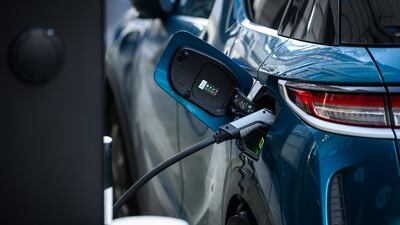The growing use of electric vehicles could cut the need for imports of petrol and diesel as much as granting new licences for UK oil production would and outpace it after 2030, according to energy analysts.
There are already about one million electric cars on British roads and a further 5.3 million are expected by 2030, the Energy and Climate Intelligence Unit (ECIU) said.
Coming into force from this month, the government’s Zero Emission Vehicle policy requires carmakers to sell an increasing number of electric vehicles (EVs), a measure intended to speed up the process of people switching away from the combustion engine.
Those 6.3 million electric cars in 2030 would reduce demand for oil so much that it could have the same effect in cutting the amount of fossil fuels imported into the UK as the government’s policy of allowing more drilling in the North Sea, according to the ECIU analysis.
The Offshore Petroleum Licensing Bill, currently passing through the Commons, would compel the North Sea regulator to invite applications for new projects each year, instead of when it feels it is appropriate, as it does currently.
Ministers argue that this will improve the country’s energy security by reducing the need to ship oil in from abroad from countries that could be hostile to the UK.
“The licensing debate only distracts from a more permanent solution to securing the UK’s energy independence which means building out British renewables more quickly to power homes and EVs as well as cutting energy waste by insulating roofs," Dr Simon Cran-McGreehin, head of analysis at ECIU, said.
“The government’s recent track record on some of these policy areas is less than stellar.”
In September, Prime Minister Rishi Sunak announced a delay for when new petrol and diesel cars will no longer be sold, from 2030 to 2035, with the Office for Budget Responsibility (OBR) saying this could mean a delay in some consumers making the switch.
He has been criticised as sidelining climate issues, not including them in his top five priorities, and for abandoning the UK’s position as a global leader in cutting emissions.
The government maintains that the UK has cut its emissions more than any other major economy since 1990 but these cuts happened before the current government and mostly because coal is no longer generally used for electricity.
Previous ECIU analysis found that only 20 per cent of oil from UK fields is refined in the UK to produce petrol and other fuels, with this figure shrinking to 1 per cent by 2030 because of reduced demand.
About 80 per cent of all the oil from the North Sea is sold abroad and the government has said it is “not desirable” for it to make companies allocate oil for the UK.
Best selling electric cars in the UK in 2022 – in pictures
It also said that most oil exports are to Europe where the fuel is refined into products that are then used in the UK.
“The government’s electric vehicle mandate policy is, in effect, an energy security policy weaning us off foreign oil imports as the North Sea’s output inevitably declines," Dr Cran-McGreehin said.
“But as the OBR has noted, last year’s government U-turn on the phase-out of sales of new petrol cars will likely reduce the number of EVs that might have been on the UK’s roads, weakening our energy security, leaving us more dependent on foreign oil.”
A Department for Energy Security and Net Zero spokesperson said: “We still rely on oil and gas for most of our energy needs and backing domestic supply bolsters energy security by reducing the reliance on imports, supporting 200,000 jobs and bringing in tens of billions of tax which we can invest in helping people with cost of living.
“At the same time we are powering our transition to more renewables and low carbon alternatives with an expected £100 billion ($1.27bn) investment by 2030 in technologies such as offshore wind, solar and carbon capture.”












